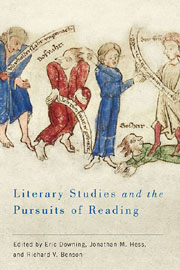Book contents
- Frontmatter
- Contents
- List of Illustrations
- Introduction
- Part I Medieval and Early Modern Practices of Reading
- Part II Reading, Secularization, and Transcendence in the Long Nineteenth Century
- Part III Theories and Practices of Reading in the Twentieth Century and Beyond
- 9 Magic Reading
- 10 “Anything One Wants”: Kafka and Women, Again
- 11 Reading on the Edge of Oblivion: Virgil and Virgule in Coetzee's Age of Iron
- Part IV Postscript: The Ends of Reading
- Works Cited
- Notes on the Contributors
- Index
11 - Reading on the Edge of Oblivion: Virgil and Virgule in Coetzee's Age of Iron
from Part III - Theories and Practices of Reading in the Twentieth Century and Beyond
Published online by Cambridge University Press: 05 February 2013
- Frontmatter
- Contents
- List of Illustrations
- Introduction
- Part I Medieval and Early Modern Practices of Reading
- Part II Reading, Secularization, and Transcendence in the Long Nineteenth Century
- Part III Theories and Practices of Reading in the Twentieth Century and Beyond
- 9 Magic Reading
- 10 “Anything One Wants”: Kafka and Women, Again
- 11 Reading on the Edge of Oblivion: Virgil and Virgule in Coetzee's Age of Iron
- Part IV Postscript: The Ends of Reading
- Works Cited
- Notes on the Contributors
- Index
Summary
Not long ago I taught a yearlong course on reading and writing for the last time. Last, because I have just retired from the university that sponsored the course and also because faculty, in their usual condition of mixed motives, aspirations, and agendas, have decided to discontinue it. I write then elegiacally, in memory of about twenty years of teaching a varying assemblage of so-called great books of literature, philosophy, religion, and even (occasionally) science, sprinkled with more-contemporary works (Toni Morrison, Orhan Pahmuk, Adrienne Rich, and others), drawn from all continents (we may have missed Australia) and written any time from Homer to the 1990s. The Core Course, as it was called, was required of all first-year students and taught in sections of about twenty by faculty from a wide range of disciplines (although mostly from the humanities). The books were not taught in chronological or geographical order but under a changing set of rubrics such as “order and chance” or “love and friendship.” The selection of texts also varied, with slight changes each year and a major recasting of the syllabus every five. The most constant fixture of the reading list was Nietzsche's On the Genealogy of Morality, which was an emblem both of the faculty's ambition to challenge and of many students' exasperation with the challenges. The explicit focus of the course was on reading and writing: reading important and often difficult books; writing responsive, analytical, and critical essays.
- Type
- Chapter
- Information
- Literary Studies and the Pursuits of Reading , pp. 233 - 248Publisher: Boydell & BrewerPrint publication year: 2012



